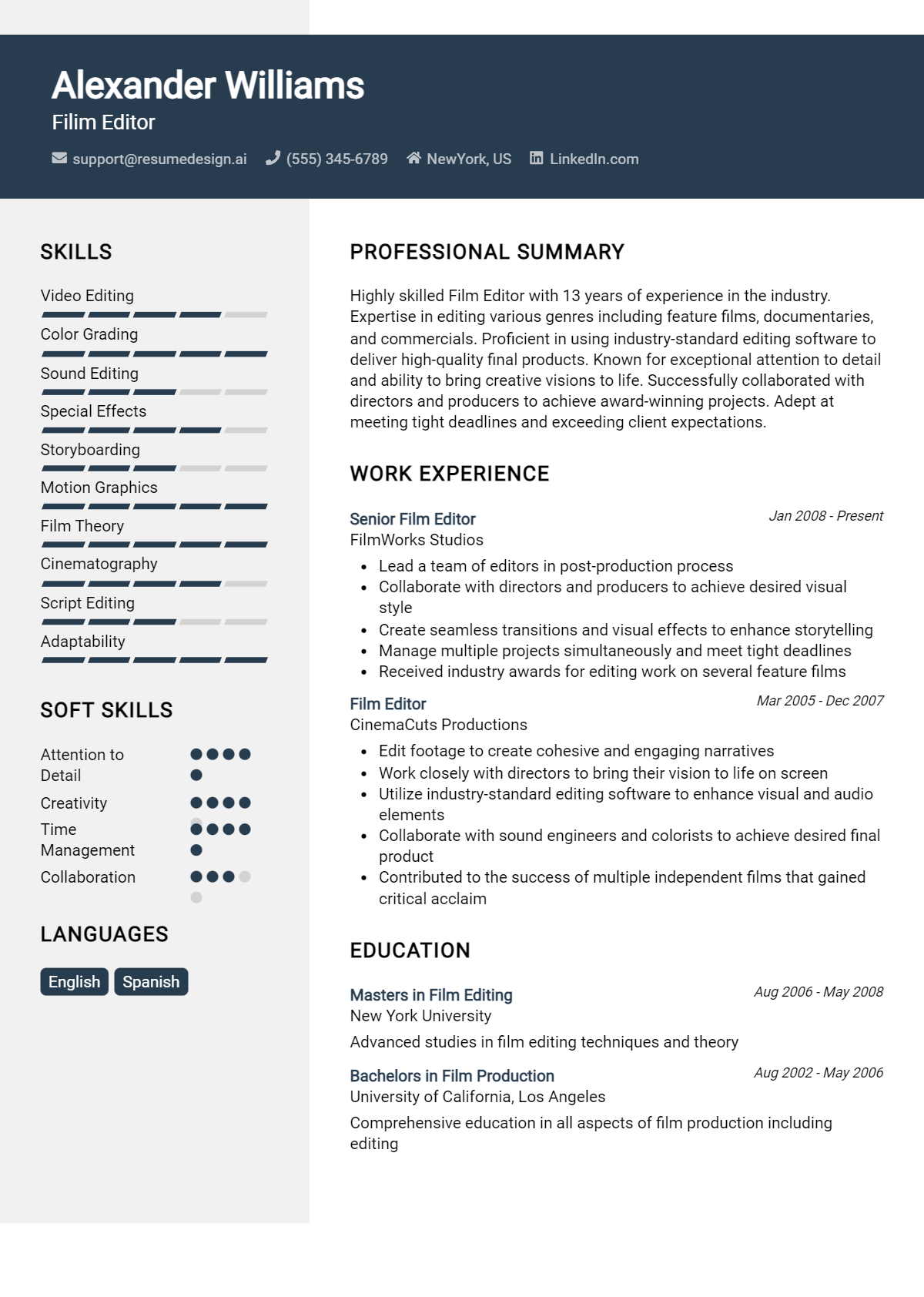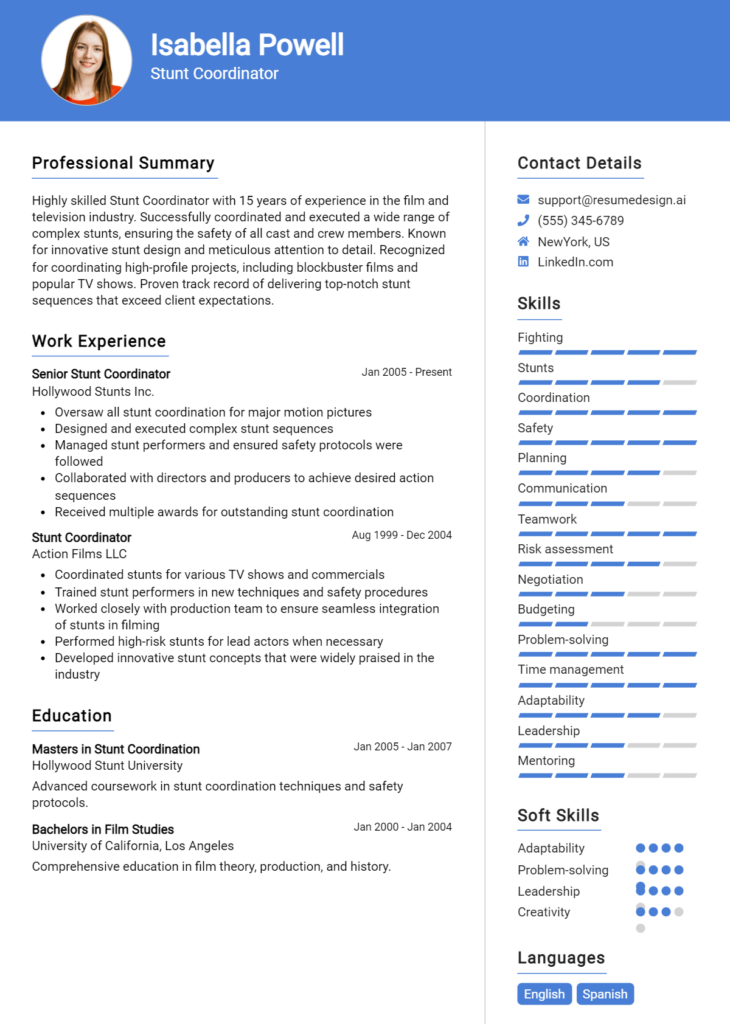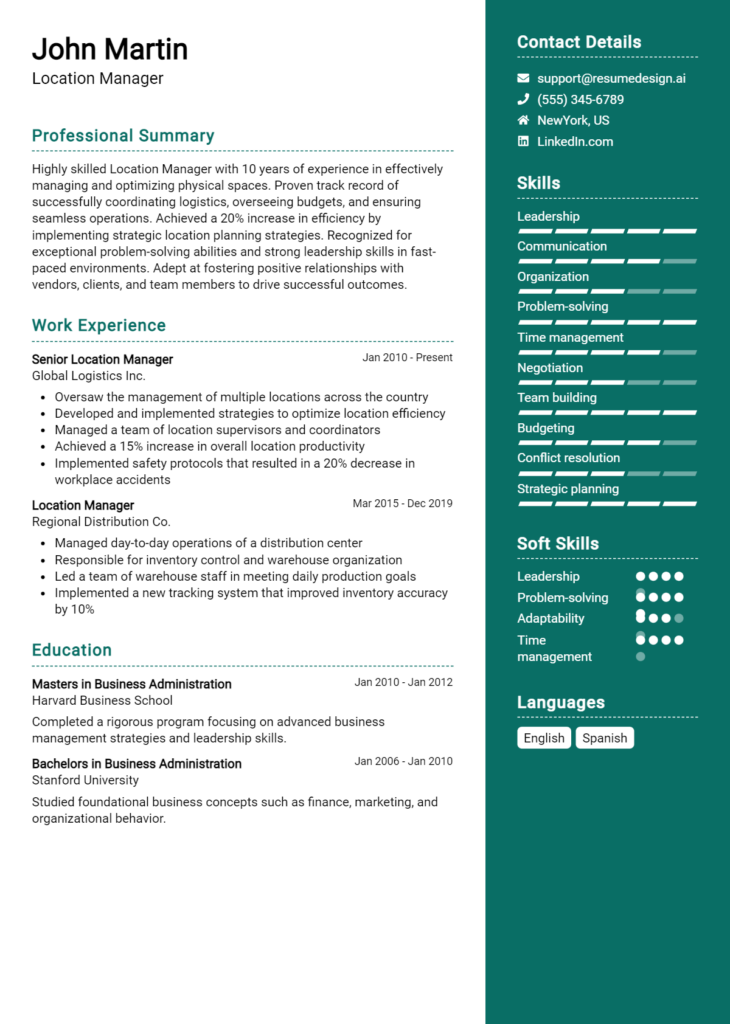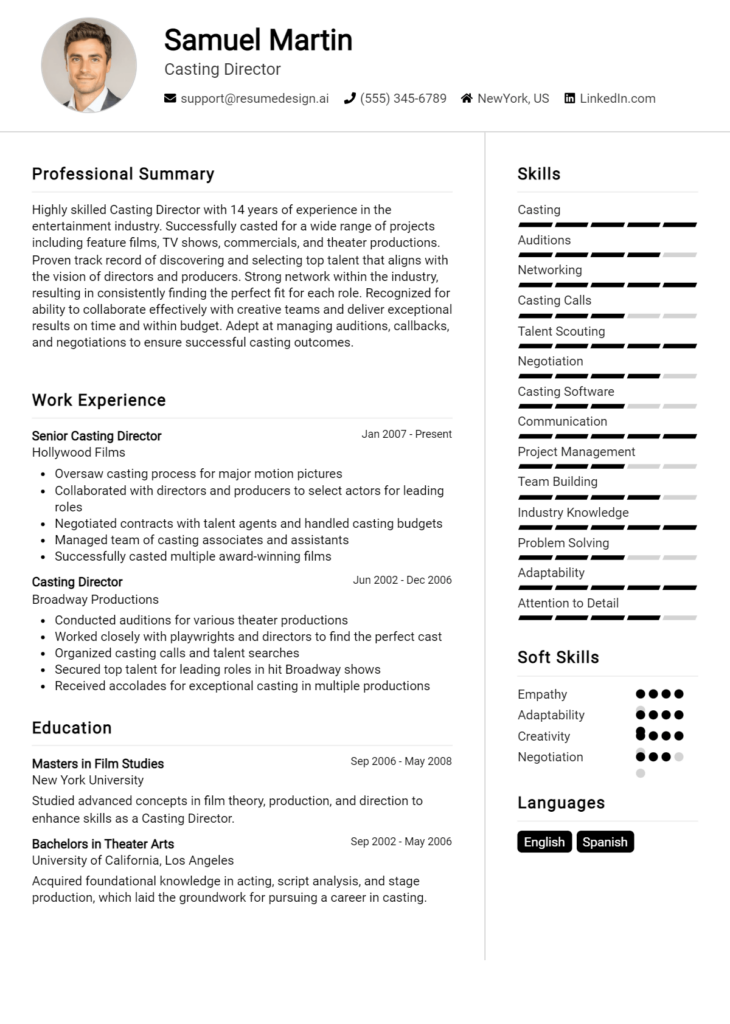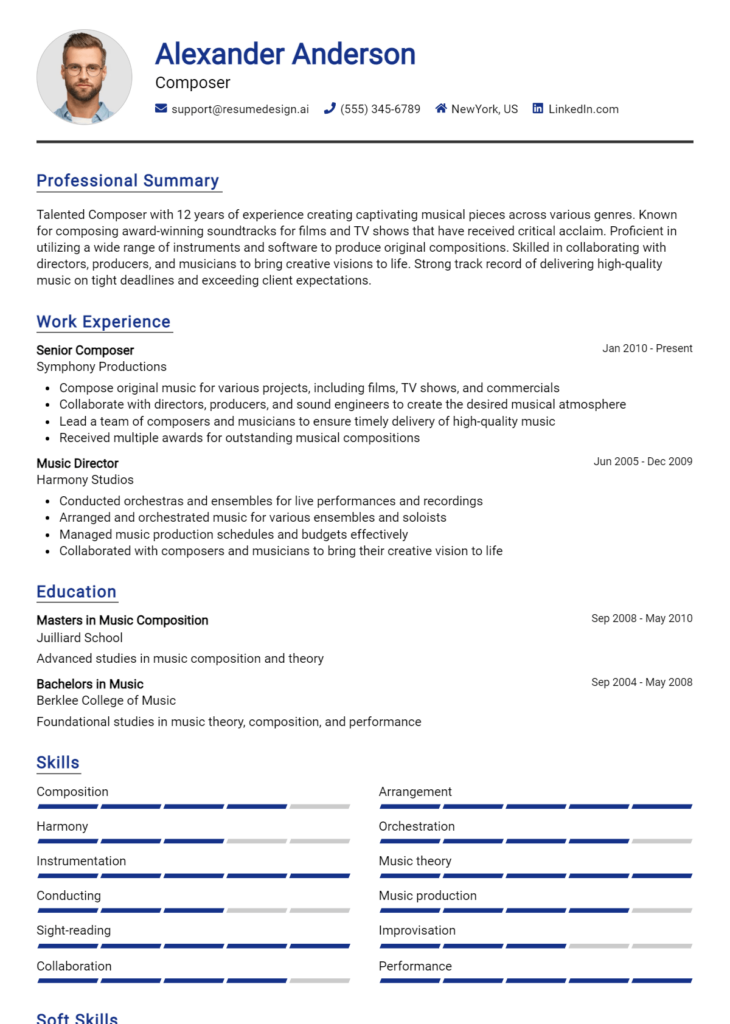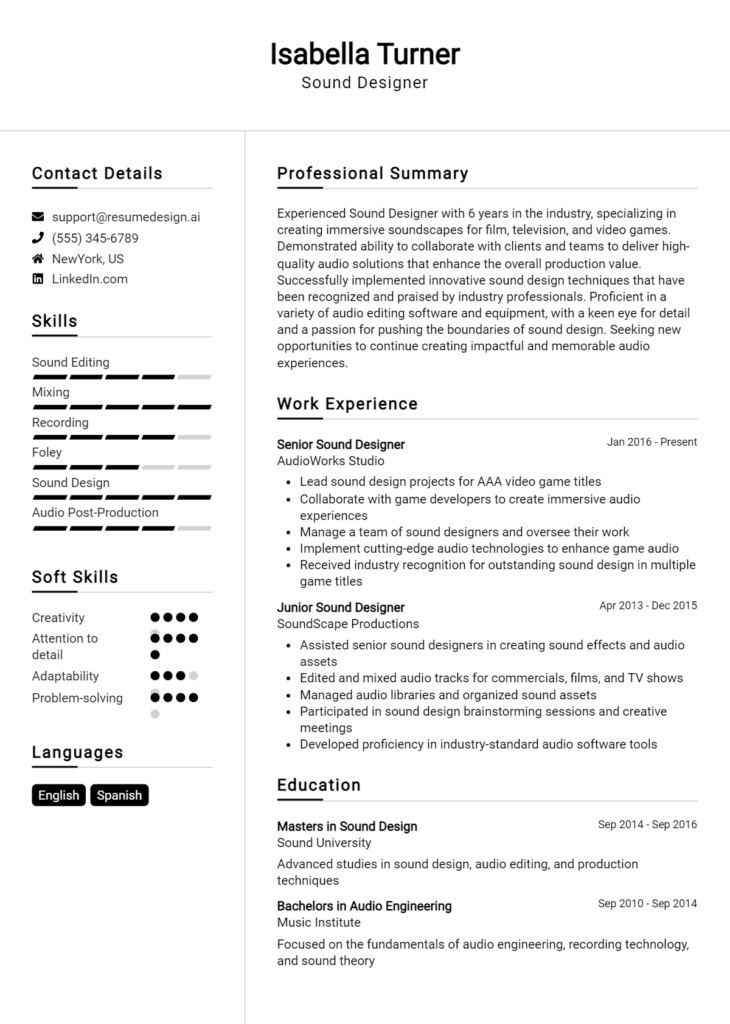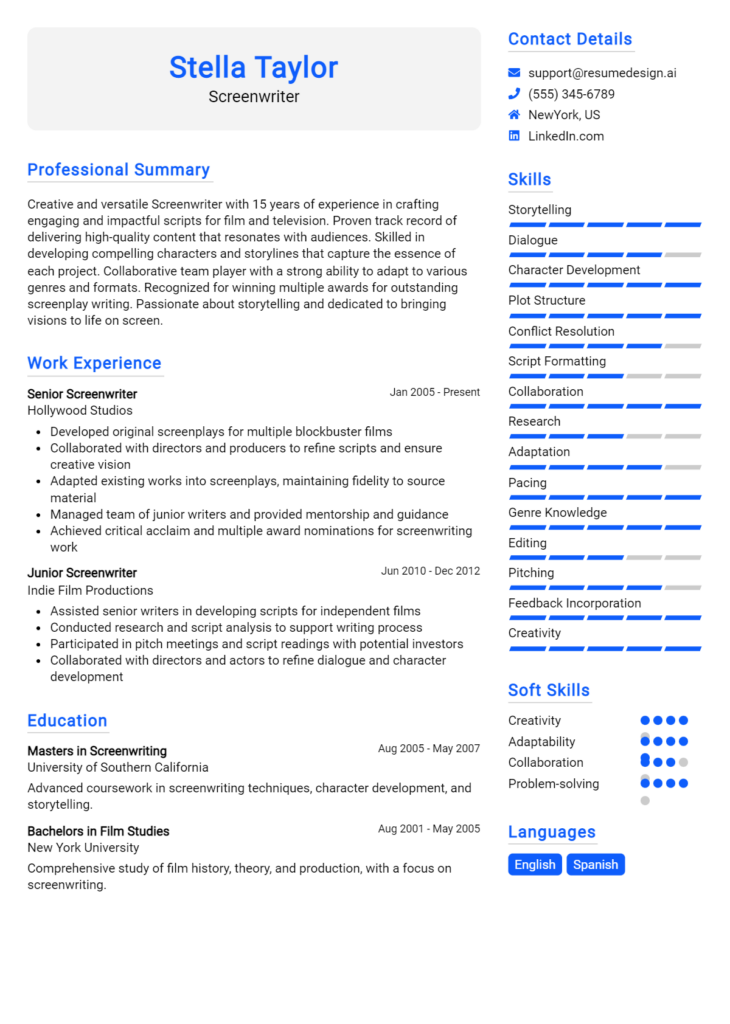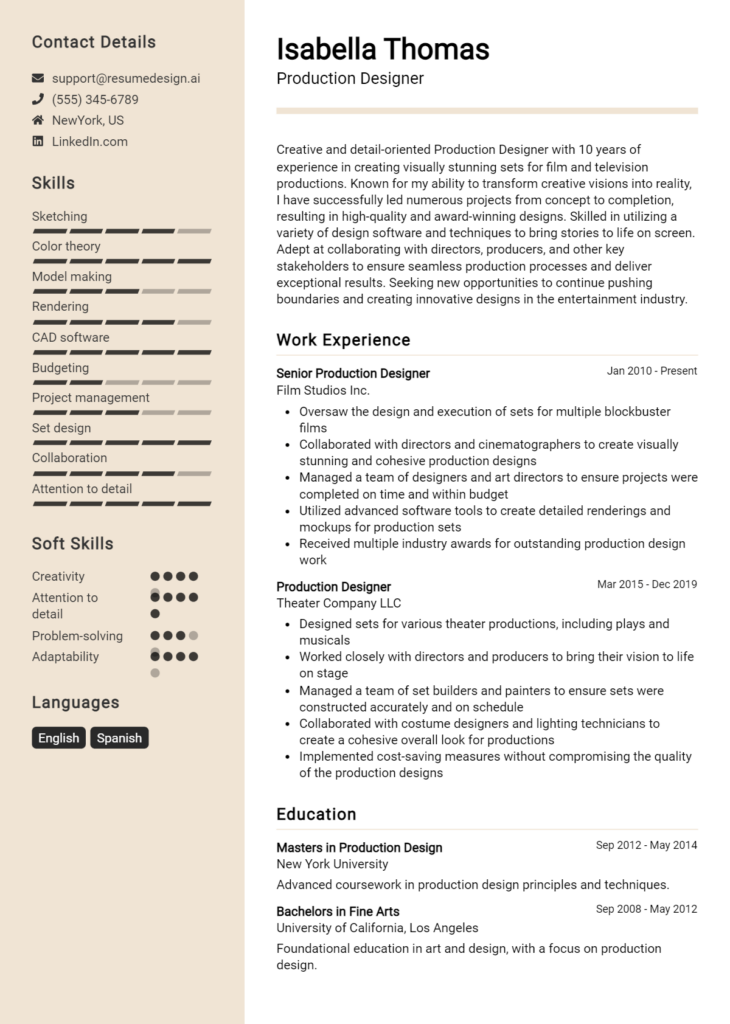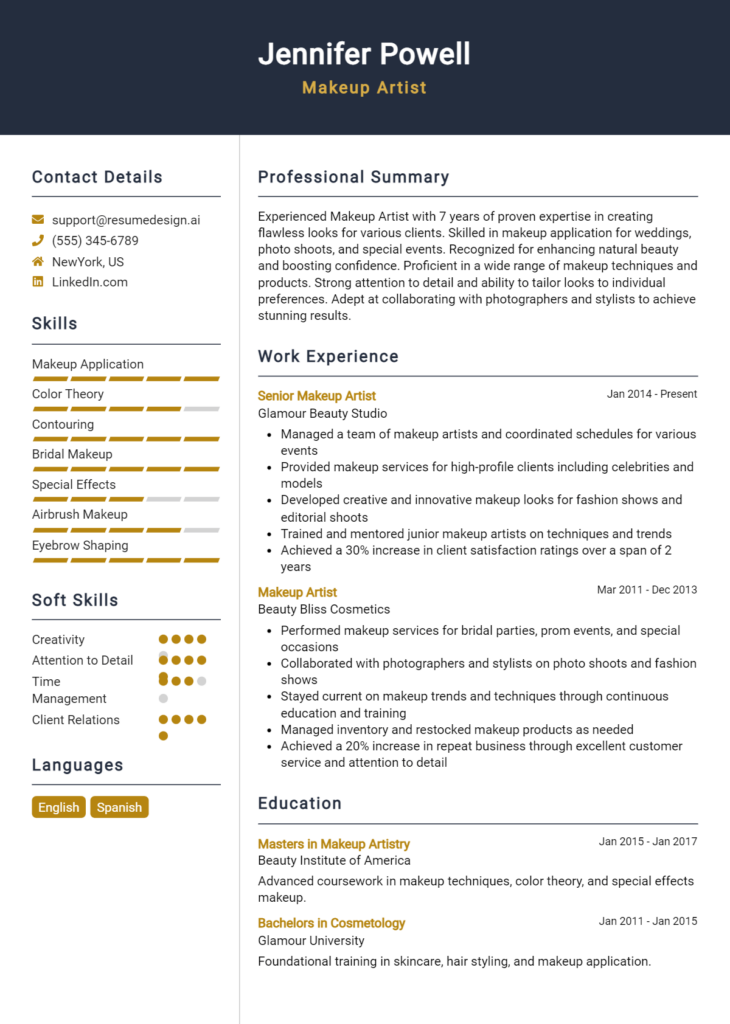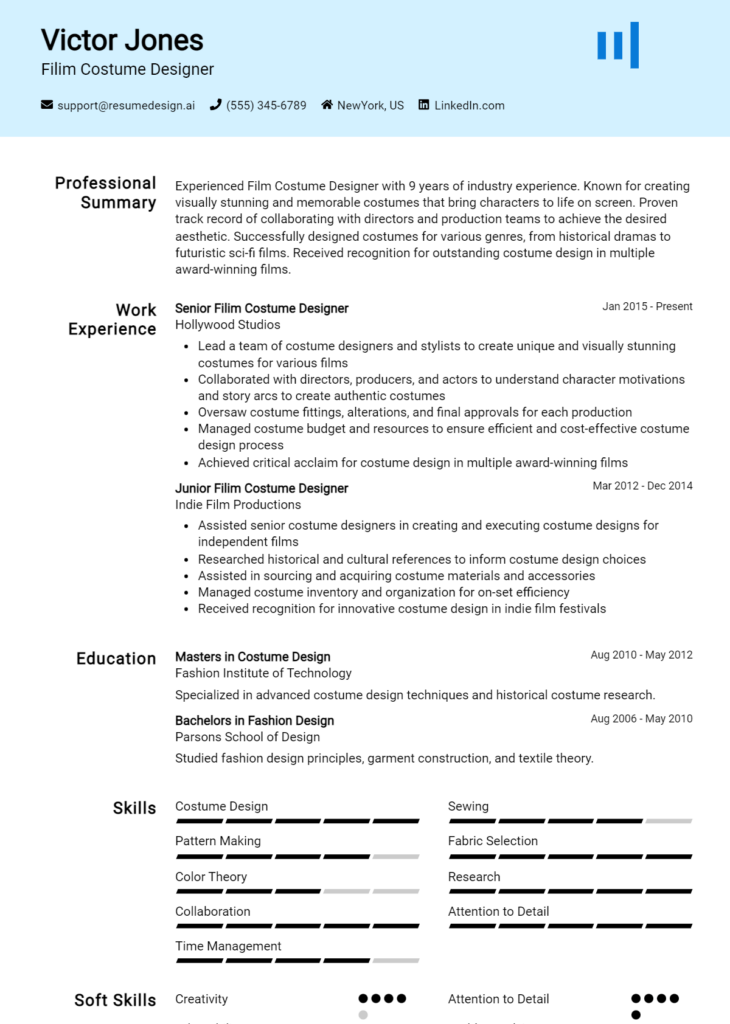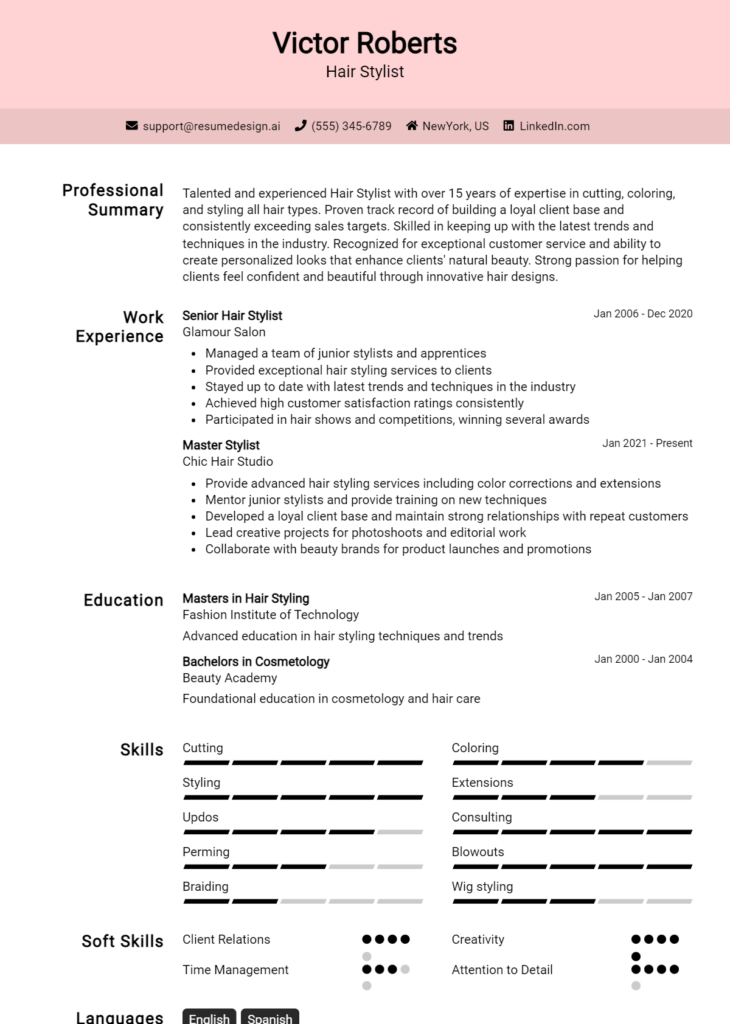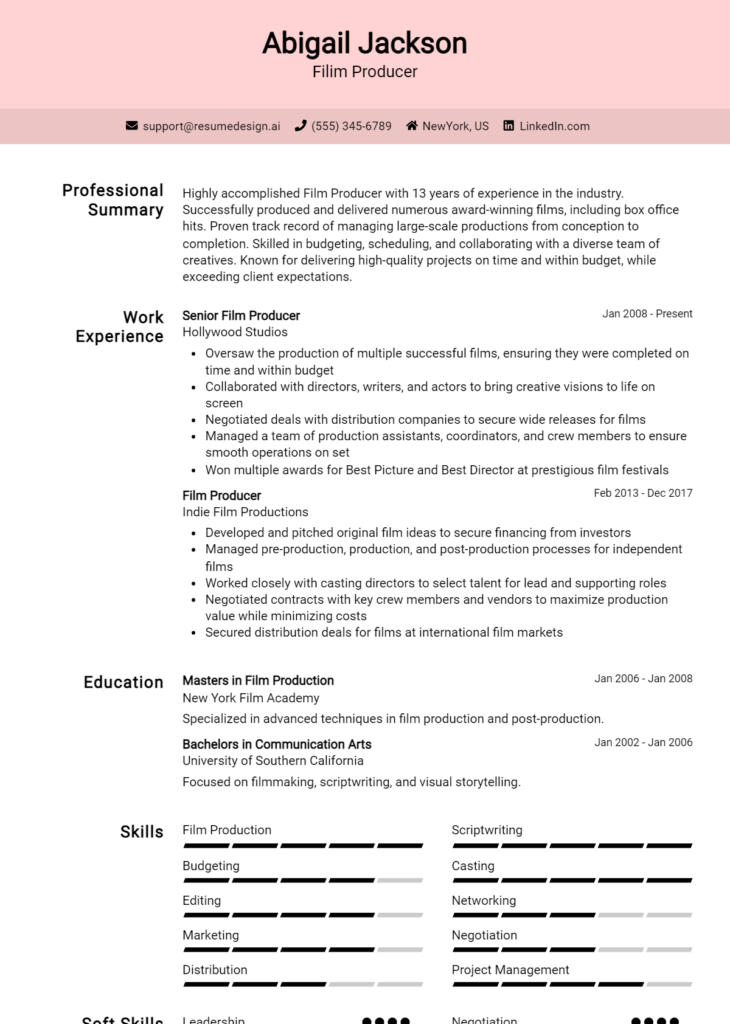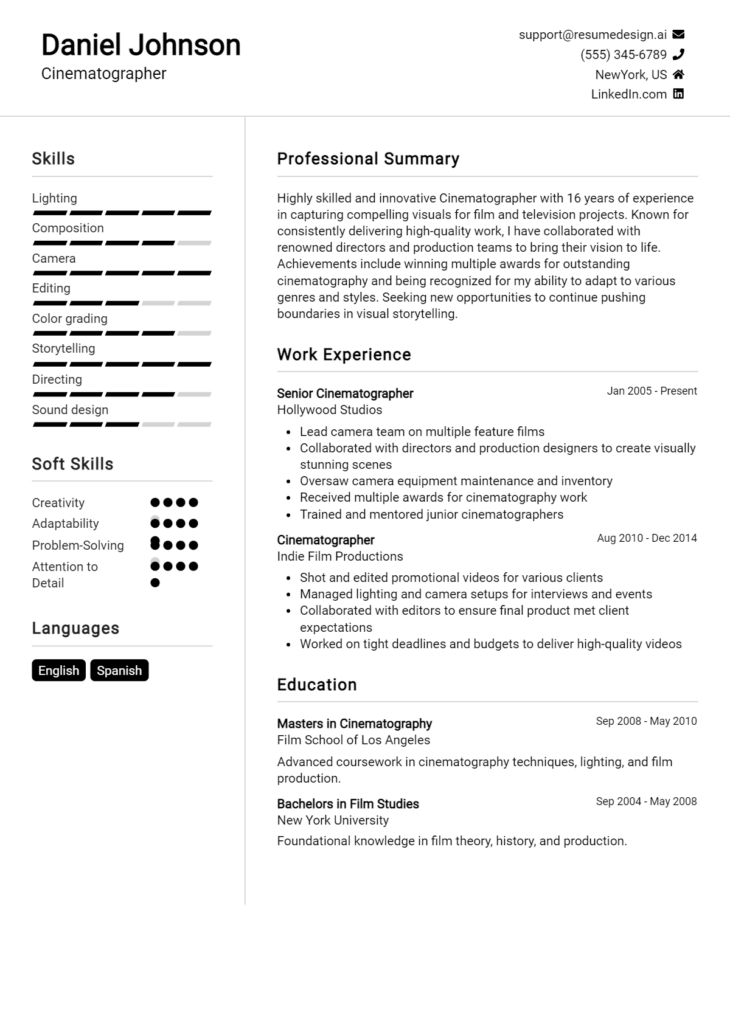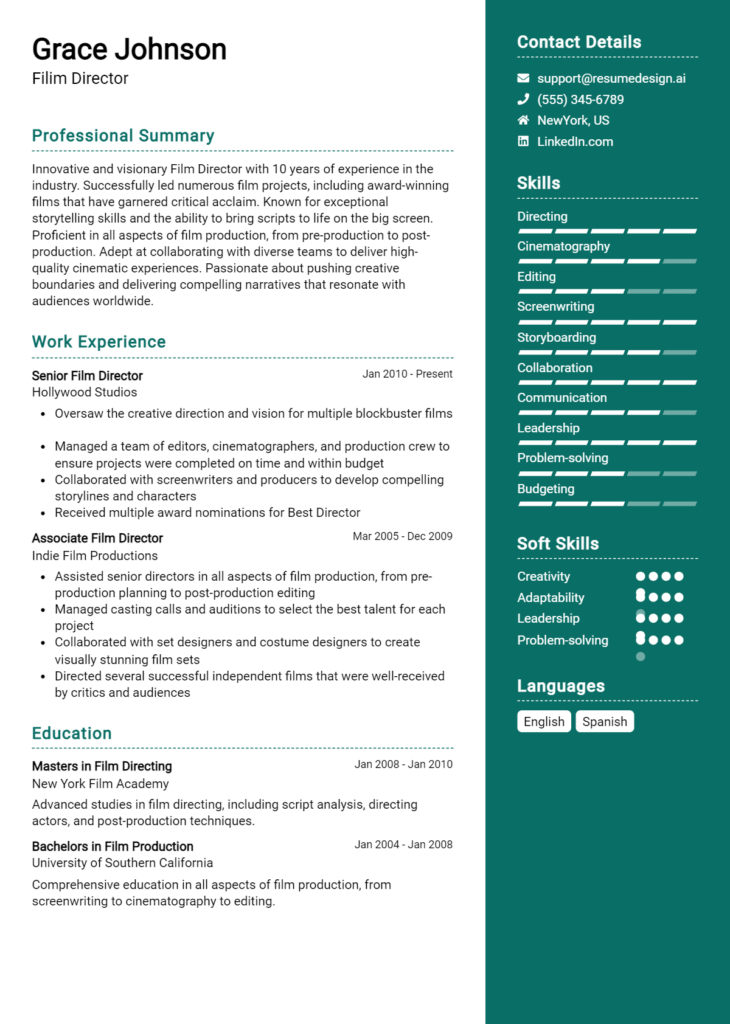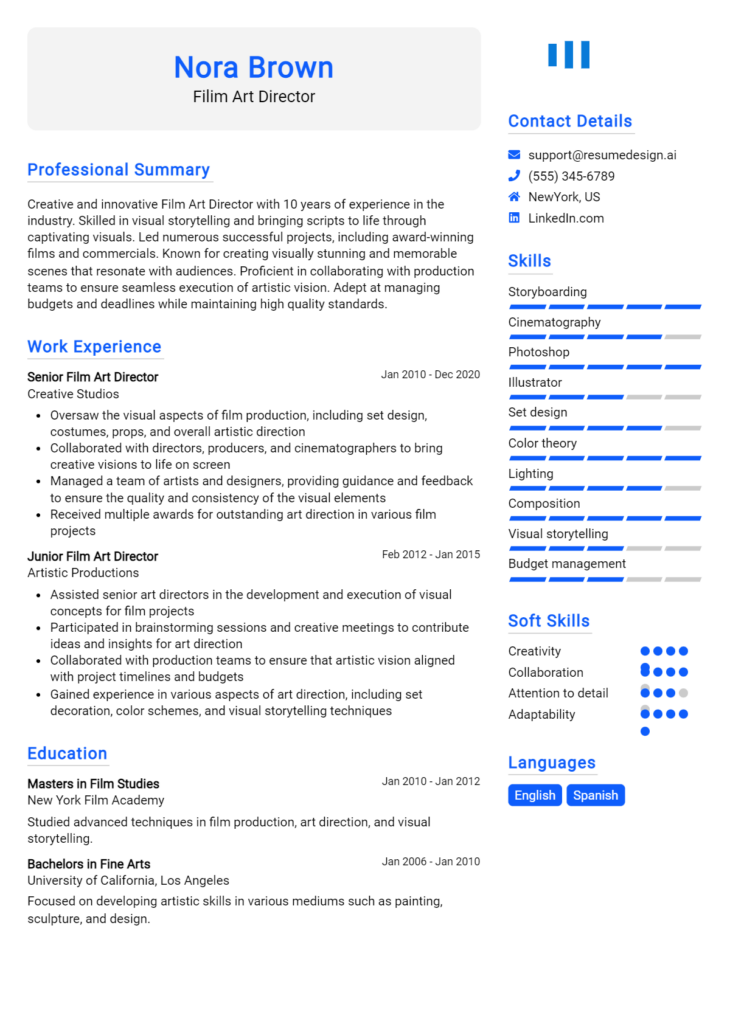Filim Editor Core Responsibilities
A Film Editor plays a crucial role in the post-production process, transforming raw footage into a coherent and engaging final product. This professional collaborates closely with directors, producers, and sound designers, ensuring that the film's narrative and pacing align with the creative vision. Essential skills include technical proficiency in editing software, strong organizational capabilities, and effective problem-solving skills to address challenges that arise during editing. A well-crafted resume can effectively highlight these qualifications, showcasing the editor's contribution to the organization’s overarching goals.
Common Responsibilities Listed on Film Editor Resume
- Assemble raw footage into a cohesive sequence
- Collaborate with directors to understand project vision
- Edit film segments for pacing and narrative flow
- Incorporate sound effects, music, and dialogue
- Review and adjust edits based on feedback
- Maintain organized files and project documentation
- Ensure continuity and consistency in scenes
- Utilize editing software proficiently (e.g., Adobe Premiere, Avid Media Composer)
- Conduct color grading and visual effects integration
- Prepare final cuts for distribution and screenings
- Collaborate with special effects teams as needed
- Stay updated on industry trends and technologies
High-Level Resume Tips for Filim Editor Professionals
For film editors, a well-crafted resume is not just a document; it is a powerful tool that can open doors to exciting opportunities in the competitive film industry. As the first impression a candidate makes on potential employers, a resume must effectively showcase both skills and achievements, reflecting the creative and technical prowess required for the role. In this guide, we will provide practical and actionable resume tips specifically tailored for film editor professionals, ensuring that your resume stands out and makes a lasting impact.
Top Resume Tips for Filim Editor Professionals
- Tailor your resume to each job application by incorporating relevant keywords from the job description.
- Start with a strong summary statement that highlights your unique skills and experiences as a film editor.
- Showcase your relevant experience by listing specific projects you've worked on, including the type of media (film, TV, online content) and your role in the editing process.
- Quantify your achievements by including metrics, such as the number of projects completed, awards won, or efficiency improvements made.
- Highlight industry-specific skills such as proficiency in editing software (e.g., Adobe Premiere, Final Cut Pro), color grading, and sound design.
- Include a portfolio link to your completed projects to provide tangible evidence of your editing capabilities.
- Use a clean and professional format that is easy to read, ensuring that your most important information is easily accessible.
- List any relevant certifications or training that could set you apart from other candidates.
- Incorporate testimonials or recommendations from previous employers or collaborators to build credibility.
By implementing these tips, you can significantly increase your chances of landing a job in the film editor field. An optimized resume that effectively showcases your skills, experience, and industry knowledge will not only capture the attention of hiring managers but also demonstrate your commitment to your craft, making you a more attractive candidate in a competitive job market.
Why Resume Headlines & Titles are Important for Filim Editor
In the competitive field of film editing, a well-crafted resume headline or title serves as a powerful tool for candidates to make a lasting impression on hiring managers. A strong headline can capture attention instantly, providing a succinct summary of a candidate's qualifications and expertise in a single phrase. It should encapsulate the essence of the applicant's skills and experiences relevant to the film editing role, ensuring that it is both concise and directly aligned with the job description. By employing impactful language, candidates can set the tone for their resume and encourage hiring managers to delve deeper into their qualifications.
Best Practices for Crafting Resume Headlines for Filim Editor
- Keep it concise: Aim for a headline that is no more than 10-12 words.
- Be role-specific: Use terminology and keywords that are relevant to film editing.
- Highlight key qualifications: Focus on your most impressive skills and experiences.
- Use action-oriented language: Start with strong verbs to convey confidence.
- Tailor to the job description: Align your headline with the specific requirements of the position.
- Incorporate measurable achievements: If possible, include numbers or accolades that demonstrate your success.
- Avoid clichés: Steer clear of overused phrases that can make your headline blend in.
- Reflect your personal brand: Ensure that your headline conveys your unique style and perspective as a film editor.
Example Resume Headlines for Filim Editor
Strong Resume Headlines
Award-Winning Film Editor with 7+ Years of Experience in Narrative Storytelling
Creative Film Editor Specializing in Documentary and Feature Films
Detail-Oriented Film Editor Skilled in Adobe Premiere Pro and Avid Media Composer
Weak Resume Headlines
Film Editor
Experienced Professional in Editing
Strong headlines are effective because they provide immediate insight into the candidate’s unique qualifications and areas of expertise, making them stand out in a sea of applicants. They are specific enough to indicate a clear specialization while also showcasing measurable achievements that attract attention. On the other hand, weak headlines fail to impress because they lack detail and specificity, making it difficult for hiring managers to gauge the candidate's fit for the role. Generic titles do not differentiate the applicant from others, which can result in missed opportunities in the competitive film industry.
Writing an Exceptional Filim Editor Resume Summary
A well-crafted resume summary is crucial for a Film Editor as it serves as the first impression a hiring manager will have of a candidate. A strong summary not only captures attention but also succinctly encapsulates key skills, relevant experience, and notable accomplishments that align with the job role. By presenting this information in a concise and impactful manner, candidates can effectively distinguish themselves in a competitive industry. Tailoring the summary to the specific job application further enhances its effectiveness, ensuring that it addresses the unique needs and preferences of the employer.
Best Practices for Writing a Film Editor Resume Summary
- Quantify achievements where possible, such as the number of projects completed or awards won.
- Highlight specific technical skills, like proficiency in editing software or experience with different film formats.
- Tailor the summary to match the job description, using relevant keywords from the posting.
- Keep it concise, ideally within 2-4 sentences, to maintain the reader's attention.
- Focus on the impact of your work, demonstrating how you contributed to the success of past projects.
- Use active language to convey confidence and capability.
- Include any notable collaborations or experiences that set you apart from other candidates.
- Proofread for clarity and grammar, ensuring the summary is polished and professional.
Example Film Editor Resume Summaries
Strong Resume Summaries
Dynamic Film Editor with over 8 years of experience in post-production, having successfully edited over 50 short films and documentaries. Proficient in Avid Media Composer and Adobe Premiere Pro, resulting in a 30% reduction in editing time on recent projects while maintaining high-quality standards.
Creative Film Editor skilled in narrative storytelling, with a proven track record of enhancing audience engagement by 40% through innovative editing techniques. Collaborated with award-winning directors and cinematographers, contributing to projects recognized at international film festivals.
Detail-oriented Film Editor with extensive experience in both independent and commercial projects. Awarded Best Editing at the XYZ Film Festival for a feature film that grossed over $1 million. Expertise in color grading and sound design, resulting in a cohesive final product.
Weak Resume Summaries
Film Editor with some experience in editing. I enjoy making films and working with others on projects.
I have worked on several films and have skills in various editing software. I am looking for opportunities in editing.
The examples provided illustrate the distinction between strong and weak resume summaries. Strong summaries effectively quantify achievements, specify relevant skills, and demonstrate direct relevance to the role, making them engaging and impactful. In contrast, weak summaries are vague, lack measurable outcomes, and do not provide sufficient detail or relevance, making them less memorable to hiring managers.
Work Experience Section for Filim Editor Resume
The work experience section of a Film Editor resume is a critical component that allows candidates to demonstrate their technical expertise, project management skills, and ability to produce high-quality visual narratives. This section showcases the candidate's hands-on experience with various editing software, collaboration with directors, producers, and other team members, and their capacity to deliver compelling final products. By quantifying achievements and aligning their experiences with industry standards, candidates can effectively illustrate their value to potential employers, making this section a key part of any successful resume.
Best Practices for Film Editor Work Experience
- Highlight specific editing software proficiency (e.g., Adobe Premiere Pro, Avid Media Composer).
- Quantify achievements, such as the number of projects completed, viewership numbers, or awards received.
- Emphasize collaboration with other departments, including sound design and visual effects teams.
- Detail your role in the editing process, showcasing technical skills and creativity.
- Use action verbs to describe your contributions (e.g., "executed," "collaborated," "produced").
- Include relevant industry certifications or training that enhance your qualifications.
- Align your experiences with the specific requirements of the job you are applying for.
- Keep descriptions concise and focused on the impact of your work.
Example Work Experiences for Film Editor
Strong Experiences
- Edited a feature film that grossed over $5 million at the box office, contributing to a 20% increase in overall viewership compared to the previous release.
- Led a team of 5 editors for a documentary series, resulting in 3 nominations at the National Documentary Awards and a 15% increase in audience ratings.
- Implemented a new editing workflow that reduced project turnaround time by 30%, enhancing team productivity and quality of output.
- Collaborated with sound designers and visual effects teams on a short film that won Best Editing at the State Film Festival.
Weak Experiences
- Worked on various editing projects with limited details provided.
- Assisted in editing tasks without specifying the outcomes or contributions made.
- Participated in film editing without any quantifiable achievements noted.
- Experience in film editing with no clear impact on the final product or audience reception.
The strong experiences are considered effective because they clearly showcase quantifiable outcomes and demonstrate leadership and collaboration, providing tangible evidence of the candidate's impact in their previous roles. In contrast, the weak experiences lack specific details and measurable results, making it difficult for potential employers to gauge the candidate's skills and contributions. This highlights the importance of crafting clear, results-oriented statements in the work experience section.
Education and Certifications Section for Filim Editor Resume
The education and certifications section of a Film Editor resume plays a crucial role in showcasing the candidate's academic background and professional qualifications. This section not only highlights relevant degrees and industry-recognized certifications but also emphasizes the candidate's commitment to continuous learning and professional development. By providing details about relevant coursework, specialized training, and certifications, candidates can enhance their credibility and better align themselves with the specific requirements of the job role, demonstrating their preparedness to tackle the challenges of film editing.
Best Practices for Film Editor Education and Certifications
- Focus on relevant degrees such as Film Production, Media Arts, or Communications.
- Include industry-recognized certifications, such as Adobe Certified Expert (ACE) or Final Cut Pro certification.
- Highlight any specialized training in editing software or techniques relevant to the film industry.
- List coursework that directly pertains to film editing, storytelling, or post-production processes.
- Be specific about the level of education, including the name of the institution and graduation dates.
- Update this section regularly to reflect new certifications or training completed.
- Consider including relevant workshops, seminars, or online courses that enhance editing skills.
- Avoid listing irrelevant degrees or certifications that do not contribute to the film editing field.
Example Education and Certifications for Film Editor
Strong Examples
- Bachelor of Fine Arts in Film Production, University of Southern California, 2020
- Adobe Certified Expert (ACE) in Premiere Pro, 2021
- Certificate in Film Editing Techniques, New York Film Academy, 2019
- Completed coursework in Advanced Film Editing and Post-Production at Columbia College Chicago.
Weak Examples
- Bachelor of Arts in English Literature, University of Texas, 2015
- Certification in Microsoft Office Suite, 2020
- High School Diploma, Anytown High School, 2012
- Online course in Creative Writing, 2021
The strong examples are considered effective because they directly relate to the film editing profession, showcasing relevant degrees, certifications, and coursework that enhance the candidate's suitability for the role. In contrast, the weak examples lack relevance to film editing, featuring qualifications that do not contribute to the candidate's expertise in the field or reflect outdated or unrelated skills, thus diminishing their impact on the resume.
Top Skills & Keywords for Filim Editor Resume
As a Film Editor, showcasing your skills on your resume is crucial to standing out in a competitive field. Your skills not only demonstrate your technical proficiency but also highlight your creative vision and ability to collaborate effectively with directors and other team members. A well-crafted resume that emphasizes both hard and soft skills can make a significant difference in attracting potential employers. Including relevant skills allows hiring managers to quickly see your qualifications, while your work experience gives context to how you've applied those skills in real-world scenarios.
Top Hard & Soft Skills for Film Editor
Soft Skills
- Attention to Detail
- Creativity
- Communication Skills
- Time Management
- Team Collaboration
- Problem-Solving
- Adaptability
- Critical Thinking
- Patience
- Emotional Intelligence
Hard Skills
- Proficiency in Editing Software (e.g., Adobe Premiere Pro, Final Cut Pro)
- Color Correction Techniques
- Sound Editing and Mixing
- Understanding of Film Theory
- Video Compression and Encoding
- Motion Graphics Knowledge
- Script Analysis
- Visual Storytelling
- Knowledge of Camera Techniques
- Familiarity with Project Management Software
Stand Out with a Winning Filim Editor Cover Letter
Dear [Hiring Manager's Name],
I am excited to apply for the Film Editor position at [Company Name], as advertised on [where you found the job listing]. With a strong background in film editing and a passion for storytelling, I am confident in my ability to contribute to your team and help bring compelling narratives to life. My experience in working with diverse genres, coupled with my technical skills and creative vision, makes me a strong candidate for this role.
Throughout my career, I have honed my editing skills by collaborating with directors, producers, and fellow editors on various projects—from independent films to corporate videos. My proficiency in industry-standard software such as Adobe Premiere Pro, Final Cut Pro, and Avid Media Composer enables me to work efficiently under tight deadlines without compromising on quality. I believe that the editing process is crucial in shaping the emotional impact of a film, and I strive to create seamless transitions and engaging pacing that resonate with audiences.
At [Previous Company/Project], I was responsible for editing a feature film that received recognition at several film festivals, highlighting my ability to transform raw footage into a polished final product. My keen eye for detail and strong communication skills allow me to understand the vision of the director while also providing my own creative input. I am particularly drawn to [Company Name] because of its commitment to innovative storytelling and the opportunity to work alongside talented professionals who share my passion for film.
I am eager to bring my unique blend of technical expertise and creative storytelling to the Film Editor position at [Company Name]. Thank you for considering my application. I look forward to the opportunity to discuss how my skills and experiences align with your team’s vision and goals.
Sincerely,
[Your Name]
[Your Contact Information]
[LinkedIn Profile or Portfolio Link]
Common Mistakes to Avoid in a Filim Editor Resume
When crafting a resume as a film editor, it's crucial to present your skills and experience in a way that highlights your unique qualifications for the role. However, many candidates make common mistakes that can detract from their appeal to potential employers. By avoiding these pitfalls, you can create a compelling resume that showcases your talent and professionalism in the competitive film industry.
Lack of Specificity: Failing to specify the types of projects you've worked on (e.g., documentaries, commercials, feature films) can make your experience seem vague and less impactful. Tailor your resume to highlight relevant projects.
Ignoring Technical Skills: Many film editors use various software and tools. Not listing specific editing programs (e.g., Adobe Premiere, Final Cut Pro) can signal a lack of proficiency. Be sure to include all relevant technical skills.
Overloading with Jargon: While industry-specific terminology is important, overloading your resume with jargon can confuse hiring managers. Use clear and concise language to describe your skills and experiences.
Neglecting Soft Skills: Film editing often requires collaboration and communication. Omitting soft skills, such as teamwork and problem-solving, can make your resume feel one-dimensional. Include these attributes to demonstrate your ability to work well with others.
Inconsistent Formatting: A poorly formatted resume can be distracting and unprofessional. Ensure consistent font sizes, styles, and spacing throughout your document to create a polished look.
Not Including a Portfolio Link: As a visual storyteller, your work speaks volumes. Failing to include a link to your online portfolio or demo reel can be a missed opportunity to showcase your editing style and creativity.
Listing Irrelevant Experience: Including unrelated job experience can dilute the focus of your resume. Stick to relevant roles that demonstrate your editing capabilities and industry knowledge.
Skipping Achievements and Impact: Simply listing job duties without highlighting your achievements can make your resume less compelling. Quantify your contributions (e.g., “reduced editing time by 20% through efficient workflow”) to showcase the value you bring to potential employers.
Conclusion
As a film editor, your role is pivotal in shaping the narrative and emotional impact of a film. Throughout this article, we've explored the essential skills, tools, and responsibilities associated with being a film editor, from technical proficiency with editing software to the importance of collaboration with directors and producers. We discussed the significance of storytelling, pacing, and the ability to convey emotion through carefully selected cuts and transitions.
Now is the time to reflect on your own qualifications and ensure that your resume effectively showcases your unique skills and experiences. A well-crafted resume can make a significant difference in standing out in this competitive field. We encourage you to take advantage of available resources to enhance your job application materials.
Consider utilizing resume templates to create a visually appealing layout that highlights your strengths. If you're looking for a more guided approach, try out the resume builder to streamline the process and ensure you include all necessary components. For inspiration, explore resume examples that can help you understand how to present your experience effectively. Additionally, don't overlook the importance of a strong application; check out the cover letter templates to craft a compelling introduction to your resume.
Take action today! Revise your film editor resume with these tools, and put your best foot forward in your next job application.

